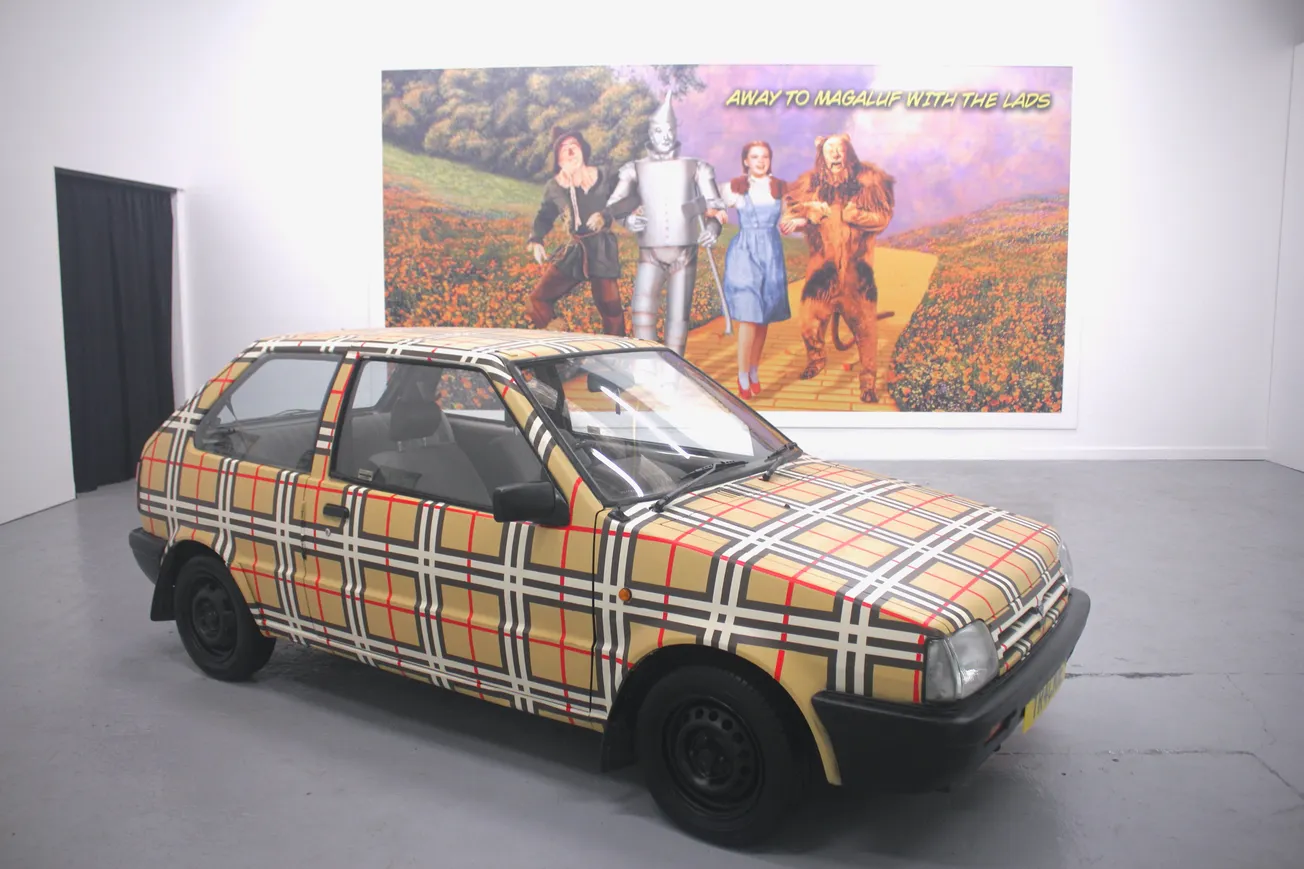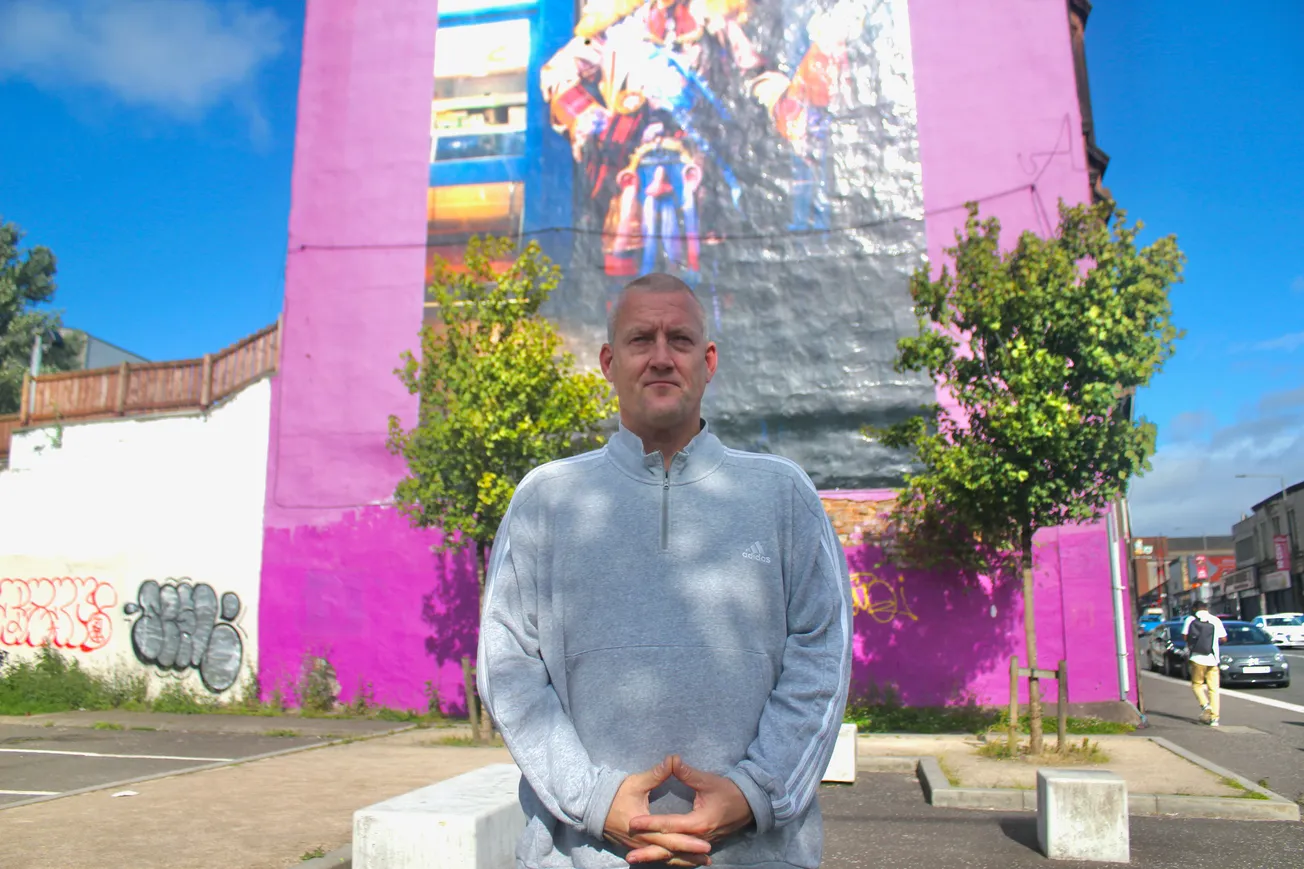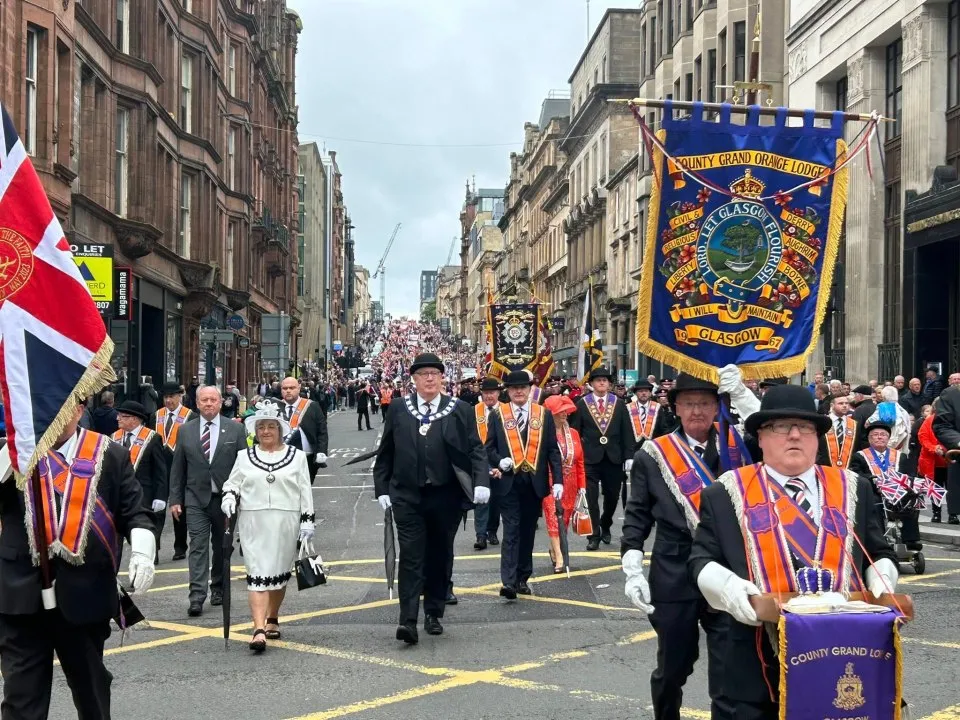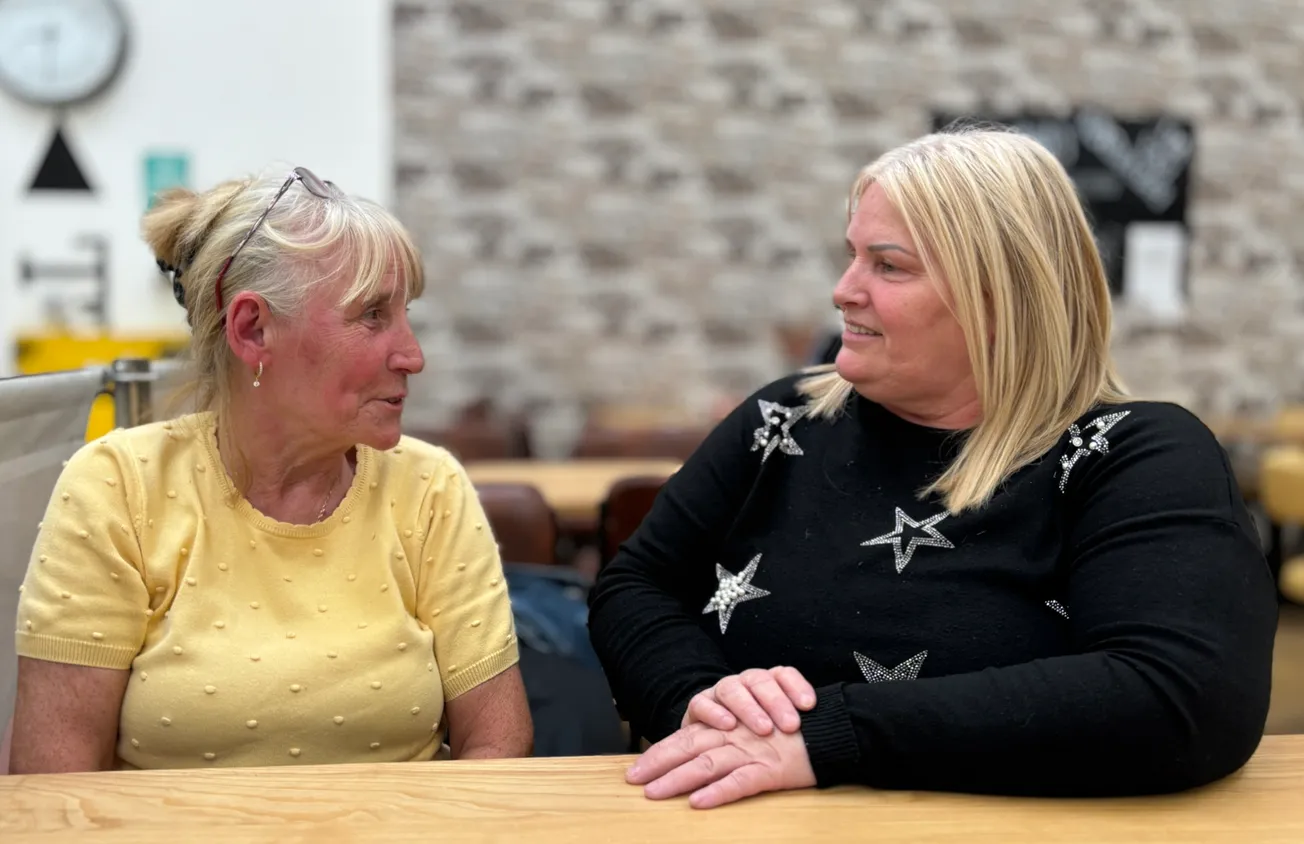It’s an oddly balmy November evening at an unassuming business park just off Govan Road. Tucked away from some nondescript offices next to a recycling plant, a cyclist is looking for a place to lock up her bike outside a warehouse. A few arty types with tote bags wander between PVC strip curtains into the space, passing a pair of converted London buses and a series of plywood studios.
At the back of the industrial unit is an exhibition space. A guy in his early 30s in a black suit and tie is working the room immaculately. He’s greeting old family friends and familiar faces, many of whom shriek with joy when he comes over to say his hellos. He’s got short peroxide-blond hair, gold hooped earrings and a gold-plated front tooth that glints under the white fluorescent lighting. Staff hand attendees cans of beer from an ice bucket as they stream into the room.
The man everyone is congratulating is visual artist Trackie McLeod. Tonight he’s all toothy smiles and infectious laughter. It’s the preview of his second solo exhibition, FRUIT at Govan Project Space — a not-for-profit artists’ studio and exhibition space. If the industrial location seems unlikely, it's not. For McLeod, showing his work here, in a non-traditional art space rooted within a working-class community, is deliberate — a way of making his art more accessible.
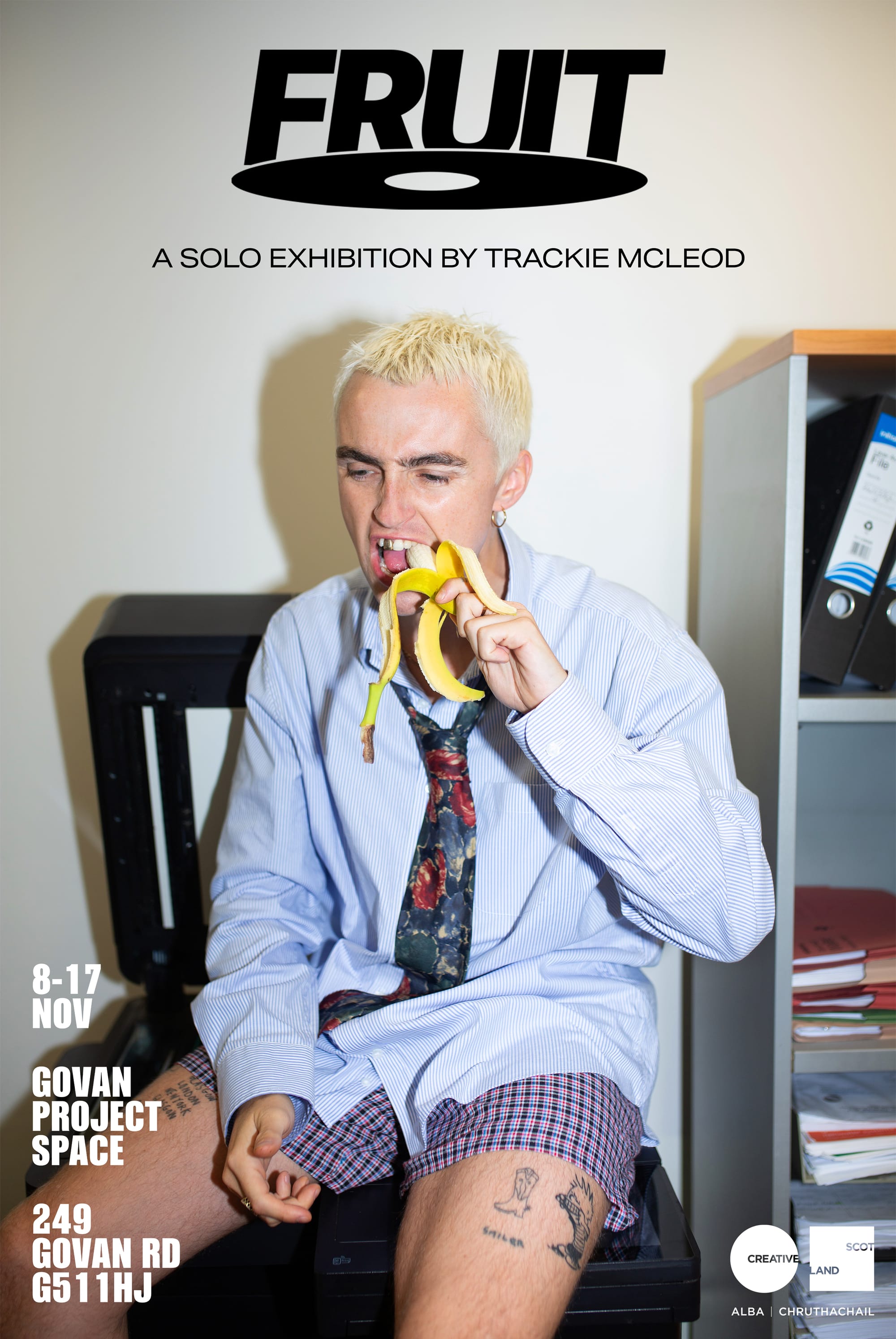
In the corner, there is a retro pay phone. Pick up the receiver, and an automated female voice recites a soliloquy about gay identity, belonging and masculinity. There are a number of ‘Trackie Times’ prints on the wall, a few of which are recognisable viral phenomena. Along the other wall are framed football shirts with the names ‘FIGHTER’, ‘GRAFTER’ and ‘SHAGGER’ printed on the back. Competing with a Burberry spray-painted Nissan Micra at the centre of the room, with ‘TR4CKIE’ and ‘MCL3OD’ on the front and rear registration plates, is a huge Wizard of Oz mural on the back wall bearing the caption ‘AWAY TO MAGALUF WITH THE LADS’. Welcome to Trackie’s all-caps universe.
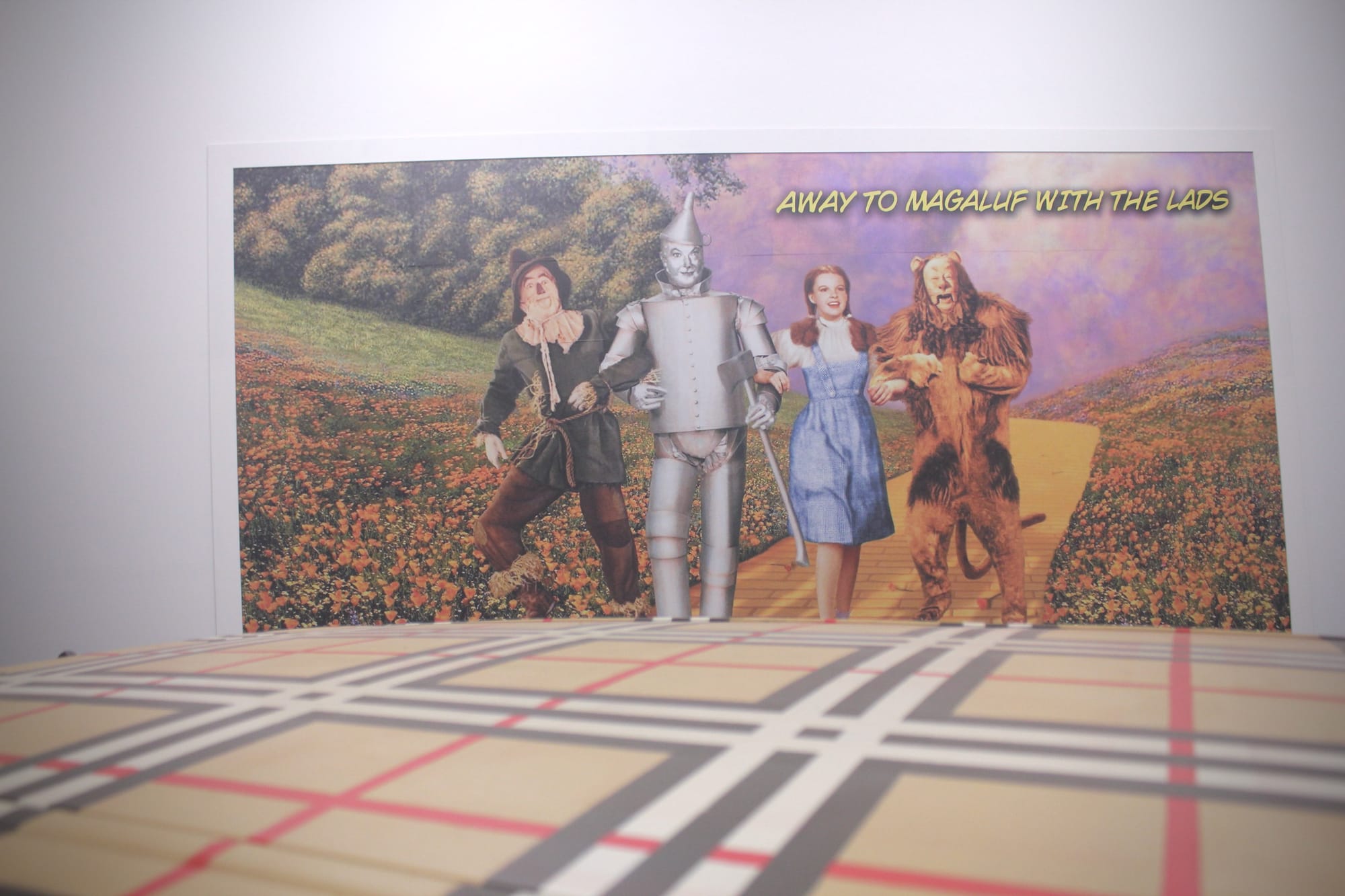
If it’s not already abundantly clear, McLeod’s art is humorous, nostalgic and deeply rooted in the Glasgow vernacular. In his own words, his work “takes the piss out of British culture”. The multidisciplinary artist has gained a reputation for playing with 90s and 00s fashion, reappropriating Scottish queer culture and toying with notions of working-class masculinity. He gained headlines for a billboard campaign that sent up the Tories (TRAINWRECK, 2022), used football shirts to lampoon sectarianism (Did This Artwork Just Cure Homophobia? 2021), and has seen his ‘Trackie Times’ posters go viral on social media (‘I’M AFF IT, CONFIRMED BIGGEST LIE TOLD IN SCOTLAND’ and ‘MAN ON TWO DAY BENDER CLAIMS: IT’S A BAG OF CANS NOT A BAG OF CAN’TS’).
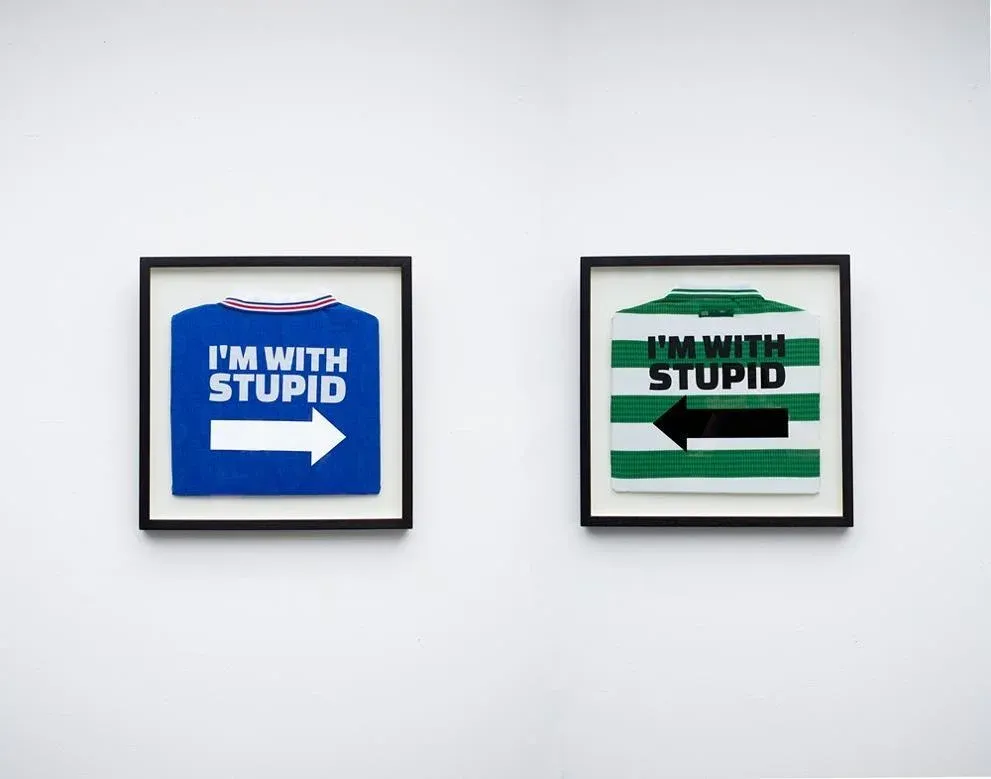
His Instagram feed is a coordinated riot of British soap opera references, sloganeering, Nokia 3310s, Burberry-checked shirts, scarves, kilts and now a car too. There is something a touch Warholian about his approach: the reproducibility, the knowing wink, the pop-culture sensibility. The abundance of tartan, kilts and kitschy shortbread-tin Scottishness is perhaps a nod to his almost sharing a name with the character Christopher Lambert plays in the 1986 film Highlander, Connor MacLeod.
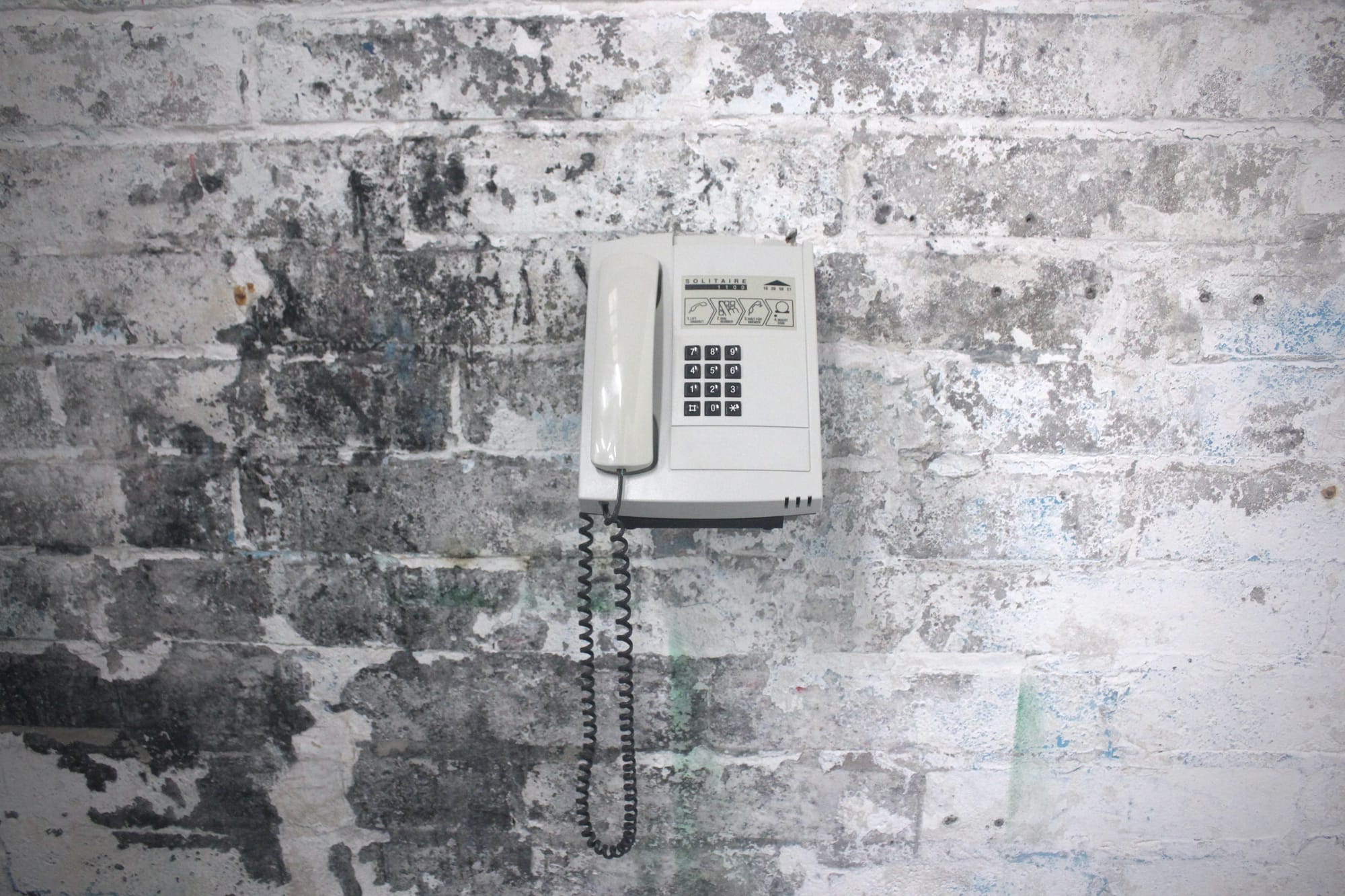
For the purposes of this new exhibition, the word ‘fruit’, according to a press release, refers to both the “gay slur and the produce we eat—a vibrant and juicy exterior that can often decay under the skin.”
“It's about my experiences growing up gay in the west of Scotland in the early 2000s — looking at life from inside the closet and outside of the closet,” McLeod explains during a break a few weeks before the exhibition launch.
FRUIT exhibition promo. Courtesy of Trackie McLeod
“I'm referencing lads holidays in Magaluf, Gap jumpers, PC DJs — just things that people all experience, but through a queer lens. I’m looking at the idea of fitting in, but also trying so hard to fit in that you're standing out. Most teenagers feel that, I think queer teenagers feel it even more, especially when you're not out at that point. [I’m] looking at uniform and how we dress,” he adds.
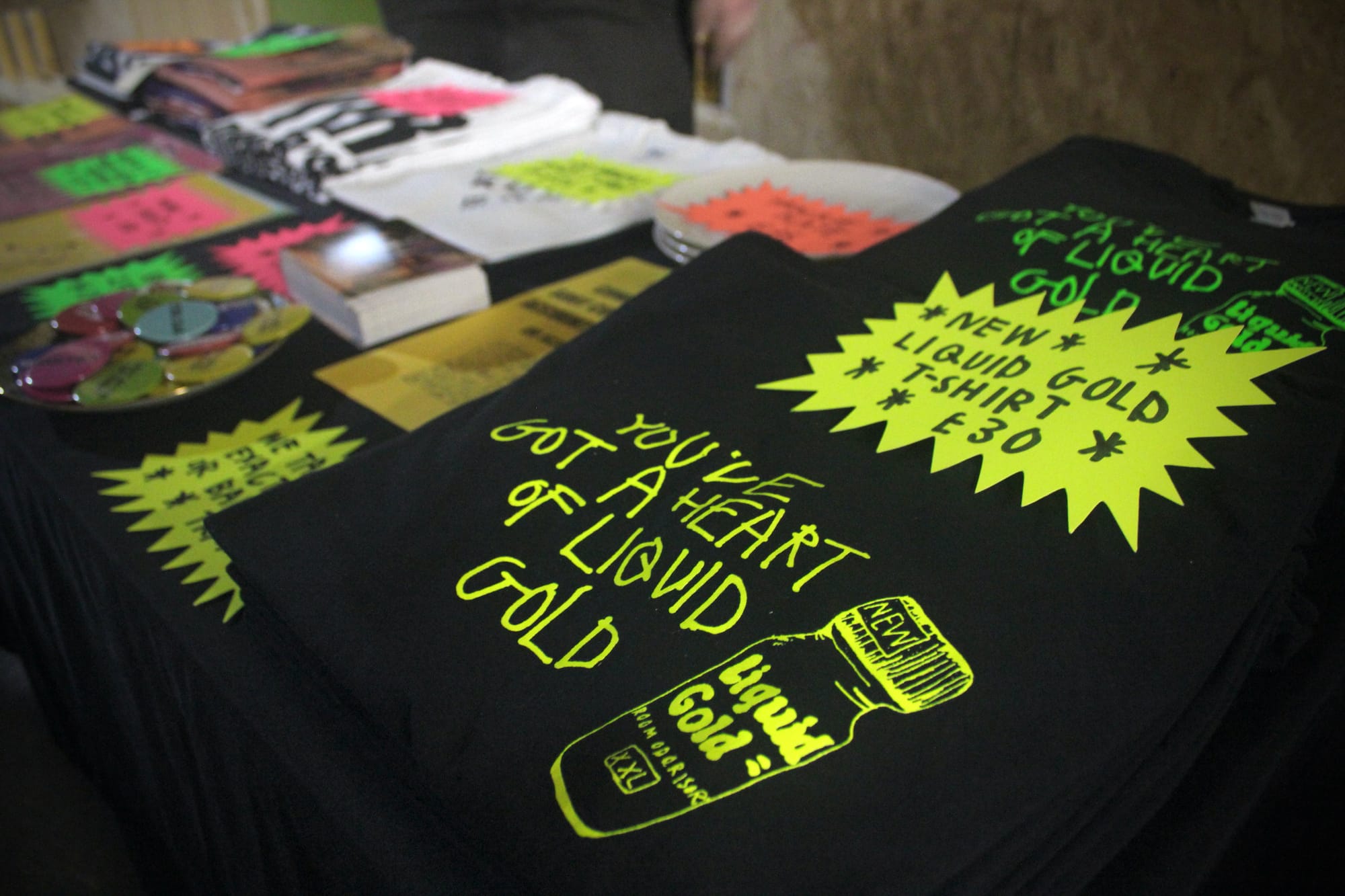
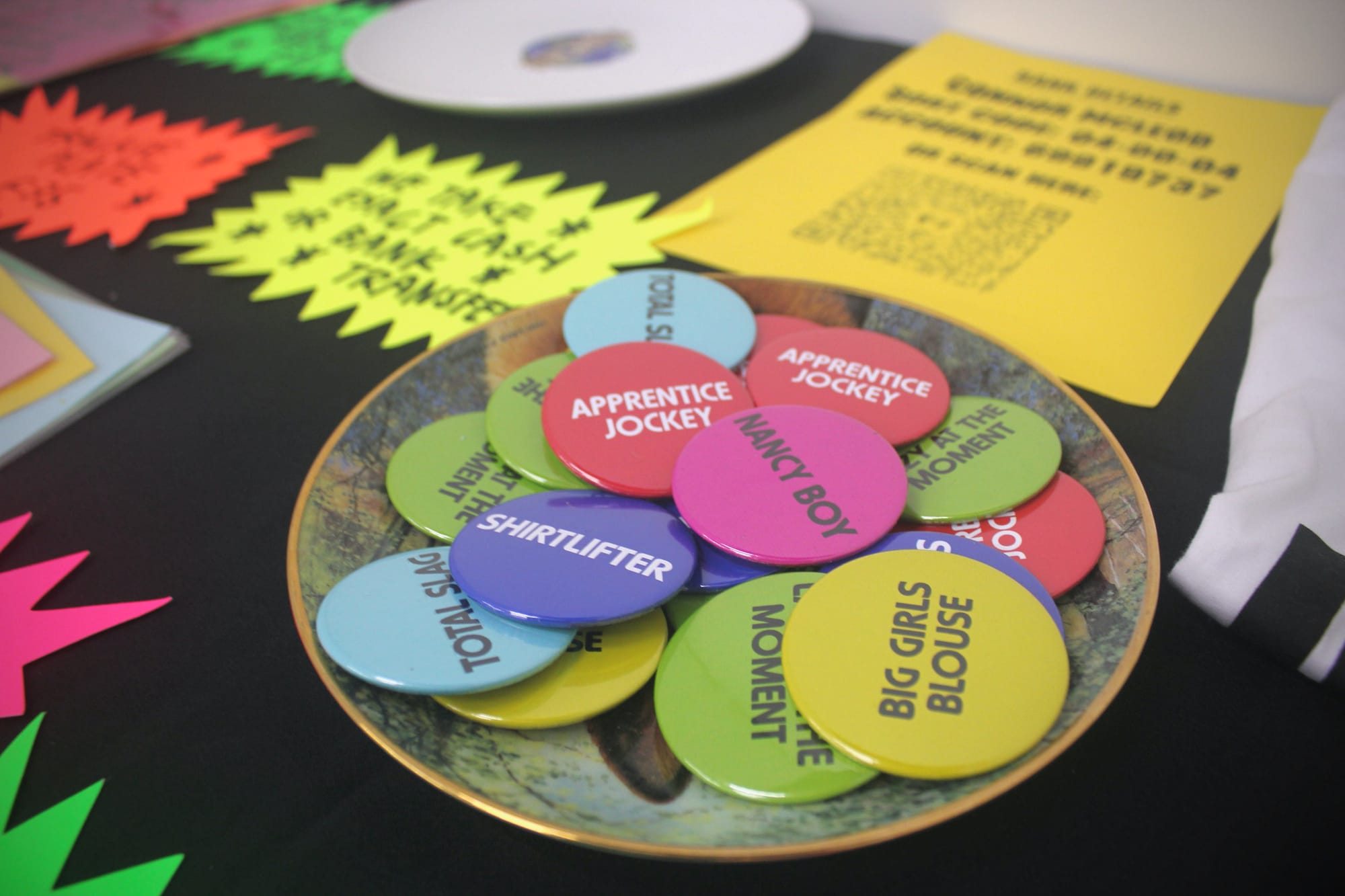
At the merch stall, a woman shows her partner a ‘SEE IT, SAY IT, SNORT IT’ monoprint with a deranged, geared-up vacuum cleaner, and they share a chuckle. Someone enquires about the poppers-themed T-shirts: ‘YOU’VE GOT A HEART OF LIQUID GOLD’ in a 'brat green' or 'Sunny Govan yella' scrawl. Yours for £30. ‘TOTAL SLAG’, ‘SHIRTLIFTER’ and ‘NANCY BOY’ pin badges are available for £4 apiece.
People pose for selfies in front of the Burberry-mobile. Others snap pictures of the football strips for their social media stories. The triptych is named ‘Monica, Erica, Rita’ after Lou Bega’s 1999 single ‘Mambo No. 5’ — the classic sort of cultural reference that any keen follower of McLeod’s work comes to expect.
“All the work is named after women, women that have influenced me or shaped me as an artist. It’s definitely a homage to women and women's role particularly for gay men. We wouldn't be doing anything without the women in our life.” Trackie says.
If you're reading this and you haven't yet joined our free mailing list, click here to get Glasgow's new quality newspaper in your inbox every week.
Off to the right, there’s a green doocot (or dookit), inside of which are strip lights and a pair of headphones. A man in a blue chore jacket puts them on and curls a smile. The sounds of 90s eurodance, trance and hard house come through the cans. (Olive’s ‘You’re Not Alone’; Love Inc.’s ‘You’re a Superstar’ and Taucher’s Remix of ‘Ayla’, to name a few of the bangers.) It’s part of a 50-minute megamix of the music that shaped the artist as a young man, underlaid with “queer awakenings, adverts and observations”.
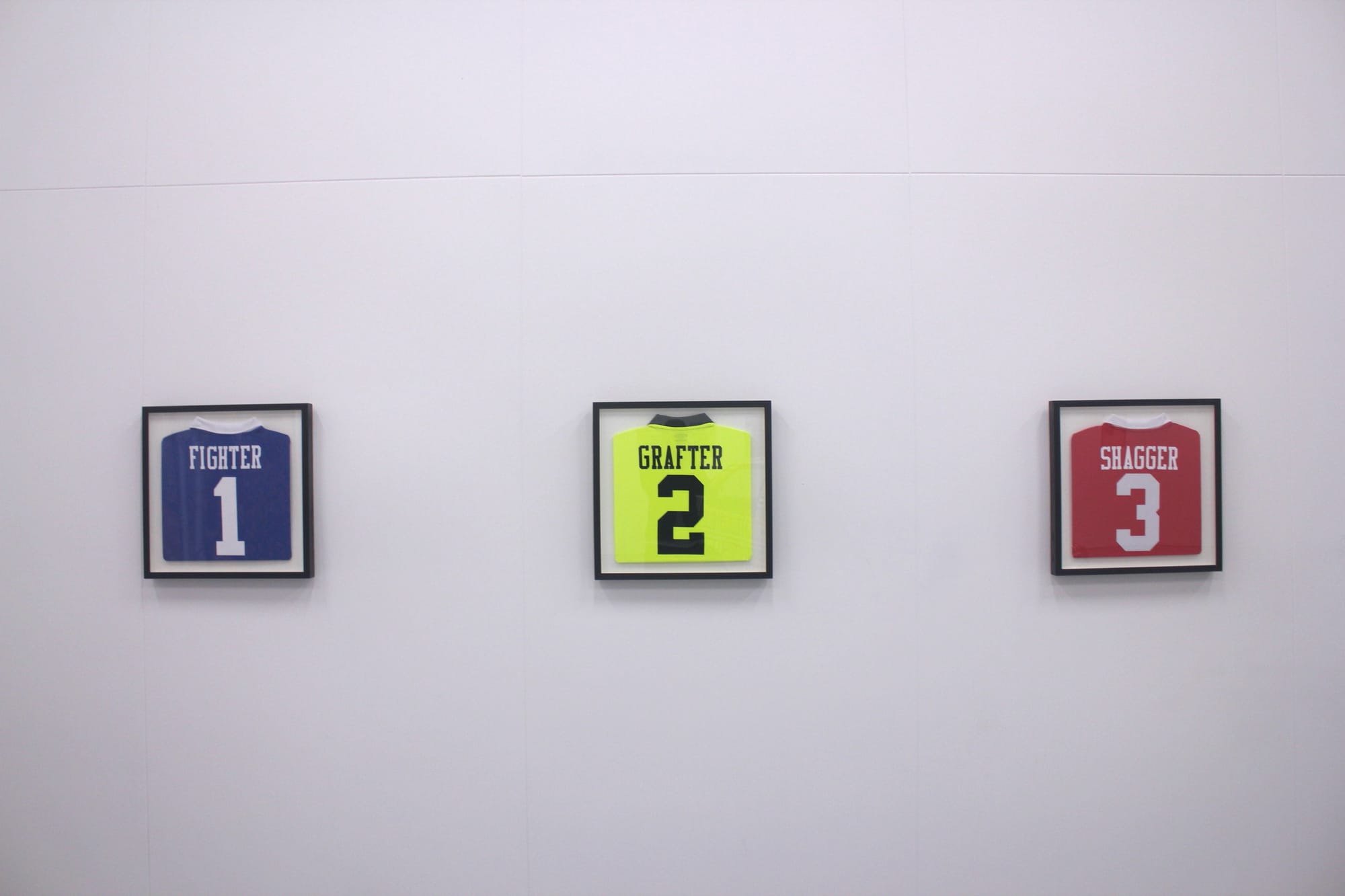
Many of the references in the exhibition marry the universal with the deeply personal. The Magaluf poster is a nod to McLeod skiving off school at his gran’s bit, “watching the Wizard of Oz, eating the contents of her biscuit tin”. The doocot piece, Mary, is in “homage to the dookits around my gran's bit,” Trackie explains the week after the launch. The inside is lit up to emulate the bright lights of the sunbeds at McLeod’s mum’s work.
“It references my childhood fears and uncertainty of what they contained that I've then transformed into a symbol of 'the closet'. People would assume the closet would be a dark place but for me it felt like I was under a spotlight. I wanted to explore what the closet looked, felt, sounded and smelled like as a teenager in the West of Scotland,” says McLeod.
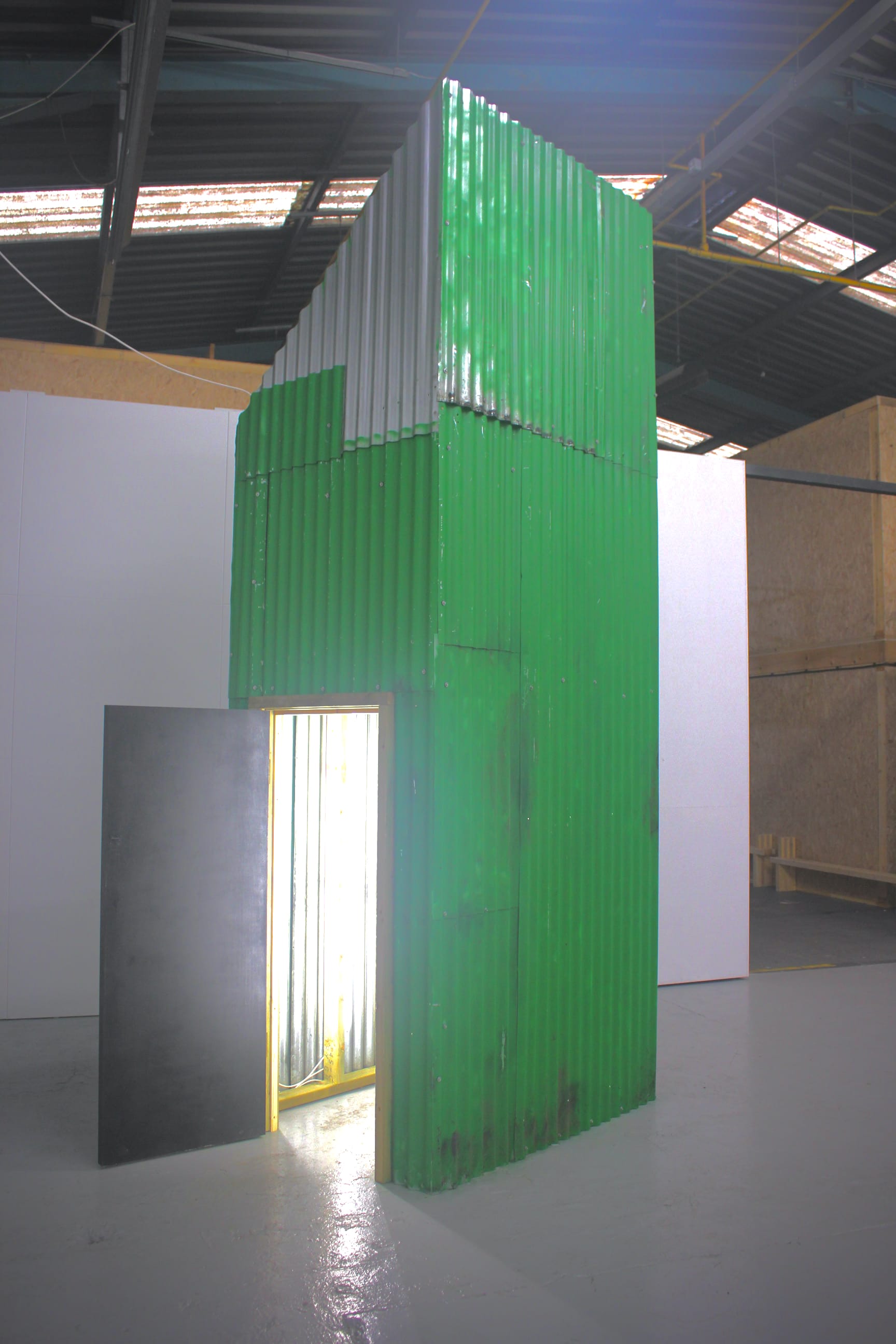
On the flipside of the A4 exhibition statement is a transcript from the Shameless episode ‘We’re Getting Married’, in which Ian Gallagher comes out. The episode neatly contains many of the themes McLeod explores in this show: closeted sexuality, homophobia, performative masculinity, shame and a large dose of 00s nostalgia.
McLeod sets it all out on the other side of the A4 sheet: “A west of Scotland and particularly Glaswegian idea of masculinity was unavoidably a central theme of my development as an adolescent,” McLeod writes.
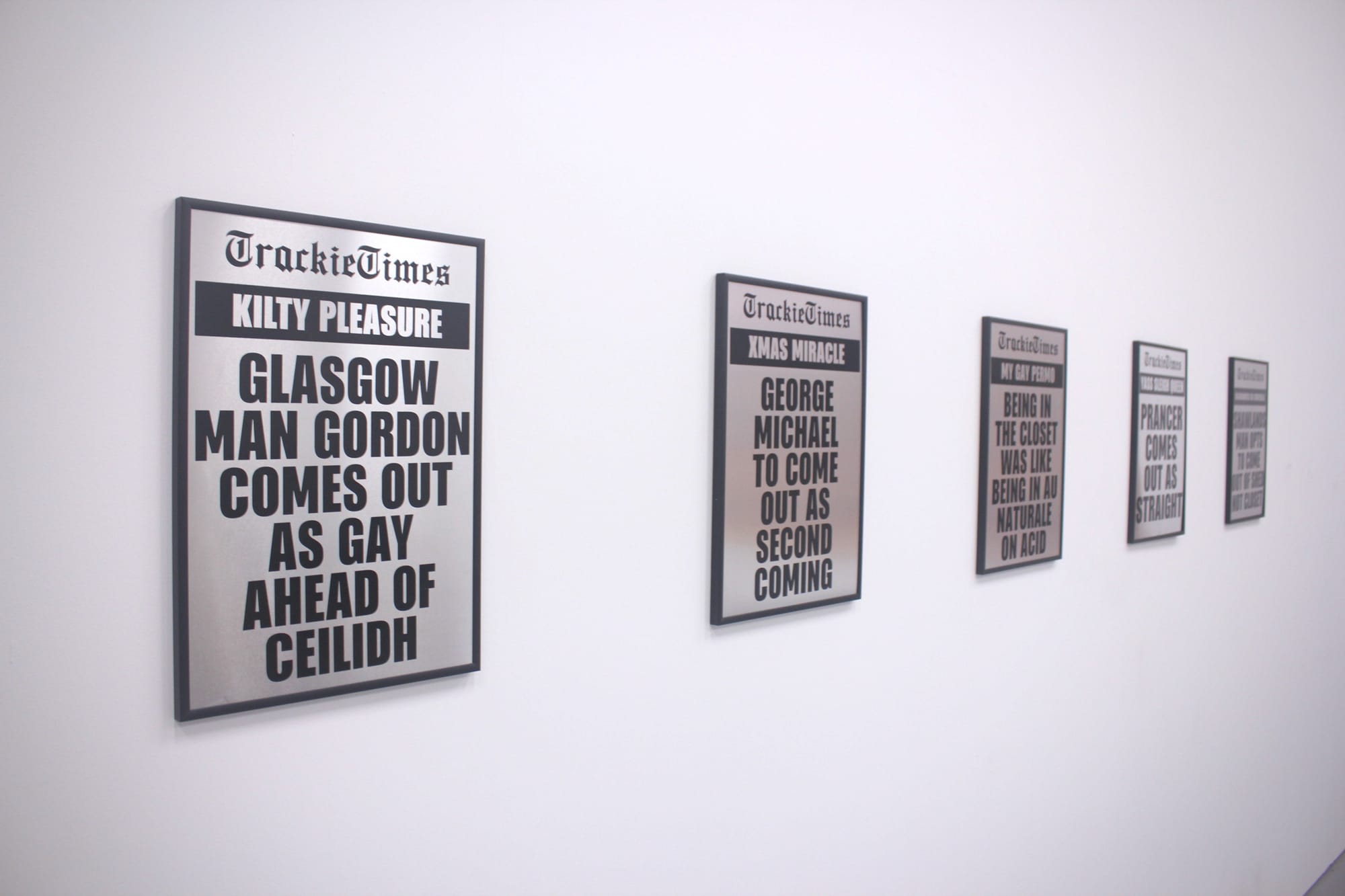
“In my youth my inner life and outer reality was littered with opposing experiences, queer tastes and interests were pitted against an often narrow view of what it means to be male in Glasgow. This juxtaposition is a continuous source to be analysed, challenged, made fun of, and redefined by my work,” he adds.
At the entrance, McLeod is hugging friends as they arrive, while Lìonadh performs some laid back songs. (Miss Cabbage will take to the decks later for a harder hitting set.) Behind McLeod, a copper screenprint of a 1989 article from the Sun twinkles in bronze.
Written by Piers Morgan four years before McLeod was born, the article has gained notoriety, notably for Morgan having gleefully employed the homophobic slur ‘yuppie poofs’ when referring to Michael Cashman’s EastEnders character, Colin, sharing a kiss with his on-screen boyfriend Guido Smith, played by Nicholas Donovan. (Morgan apologised when the column resurfaced in 2020 upon publication of Cashman’s book One of Them). According to Ofcom, this was the first mouth-to-mouth kiss between two gay male characters to be broadcast on British TV.
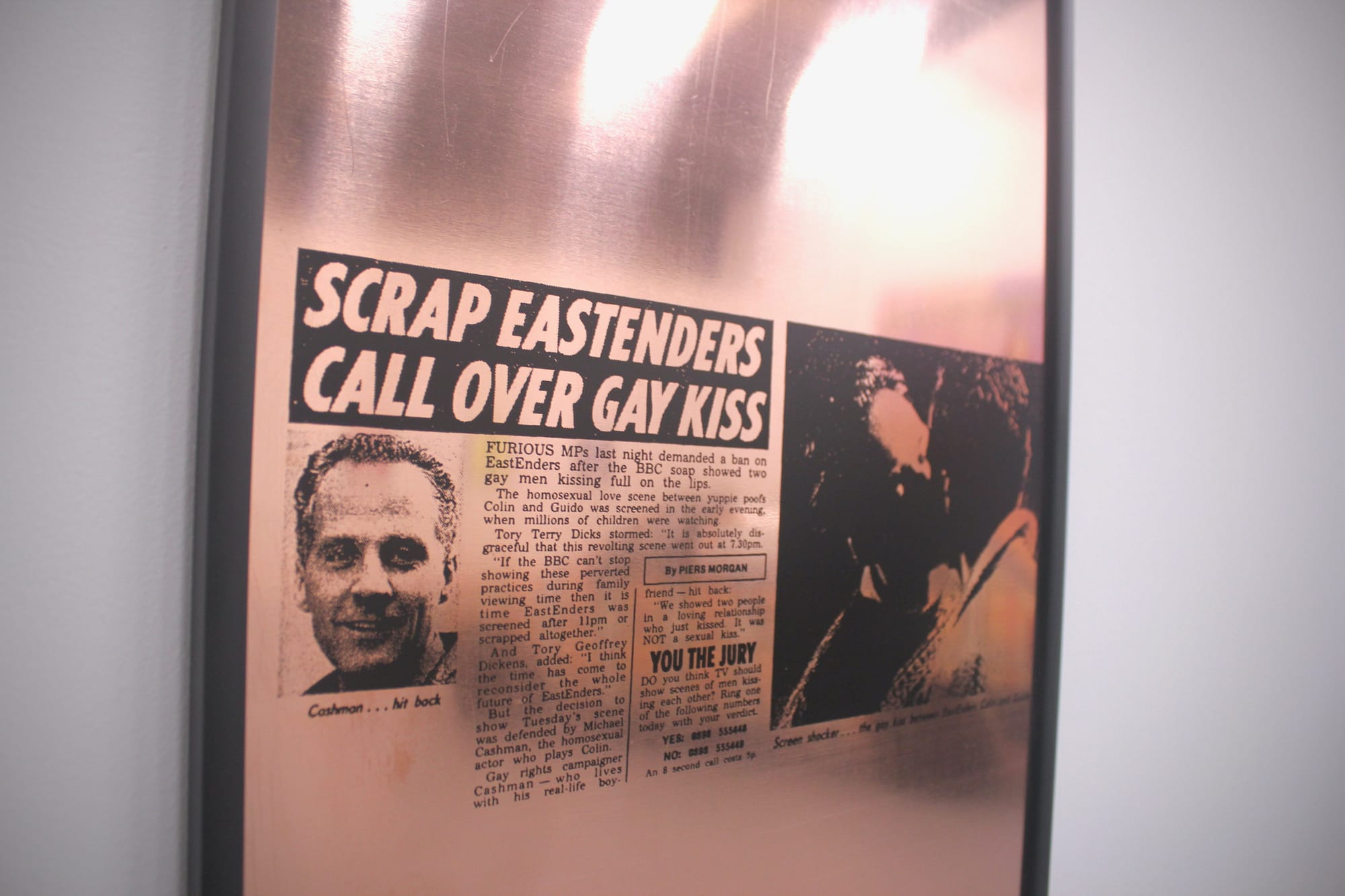
It’s not only tabloid homophobia that McLeod has in his sights. “High concept art can sometimes leave people out of the conversation, that's not something I want to achieve with my work. Art should be for everyone, but it's still being gatekept,” he later explains.
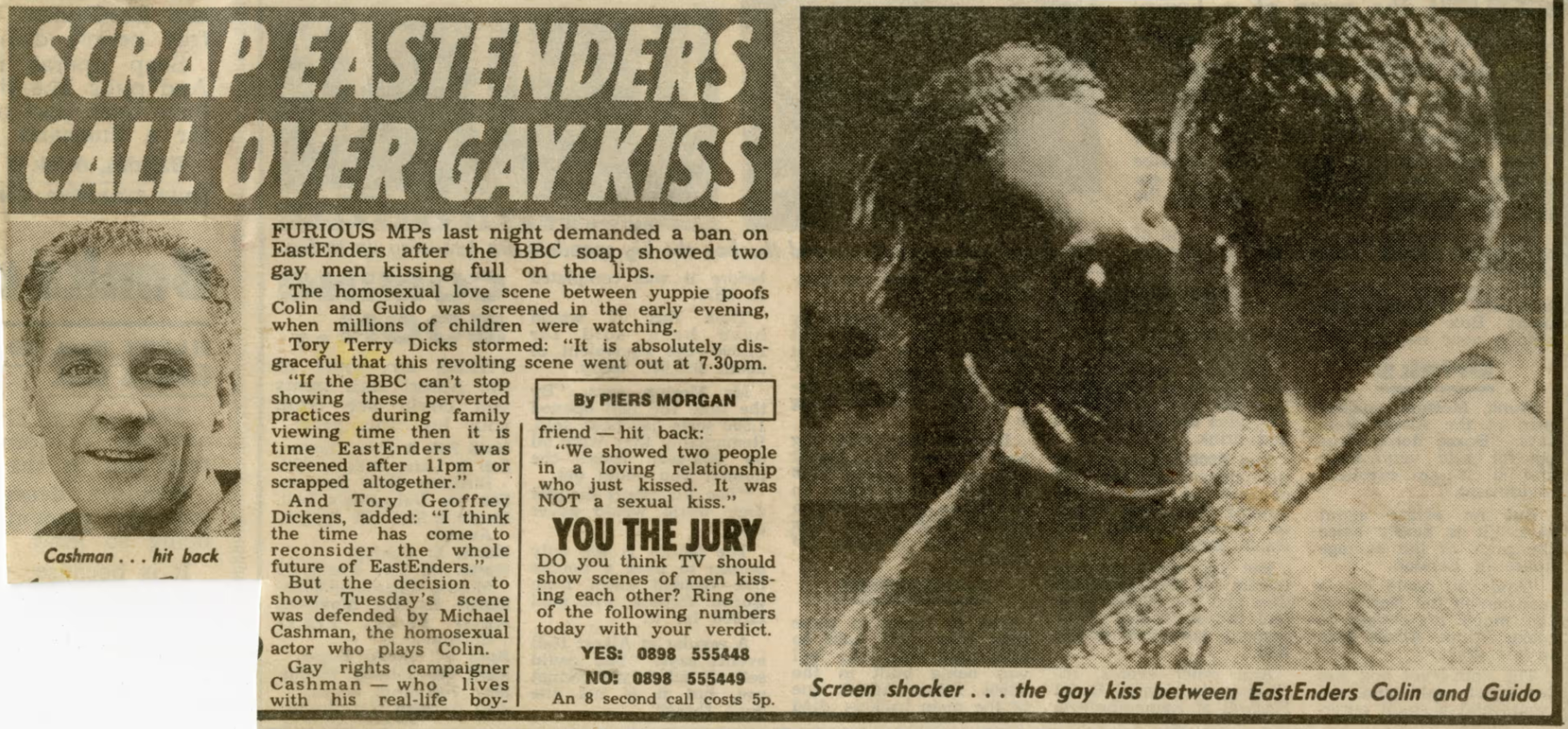
McLeod is part of a cohort of working-class creatives juxtaposing high and low art, such as the Irish political artist Adam Doyle, better known as Spicebag. You could also draw parallels with some of the visual art of Darren Cullen (AKA Spelling Mistakes Cost Lives), or the Edinburgh clothing brand Pieute.
He says the book The Velvet Rage by Alan Downs was a big inspiration for FRUIT, particularly the ways in which Downs explored feelings of shame among gay men.
“I wanted to hone in on the feeling of shame and what it looks like and what it sounds like, and comment on how society perpetuates shame, homophobia and internalised homophobia.”
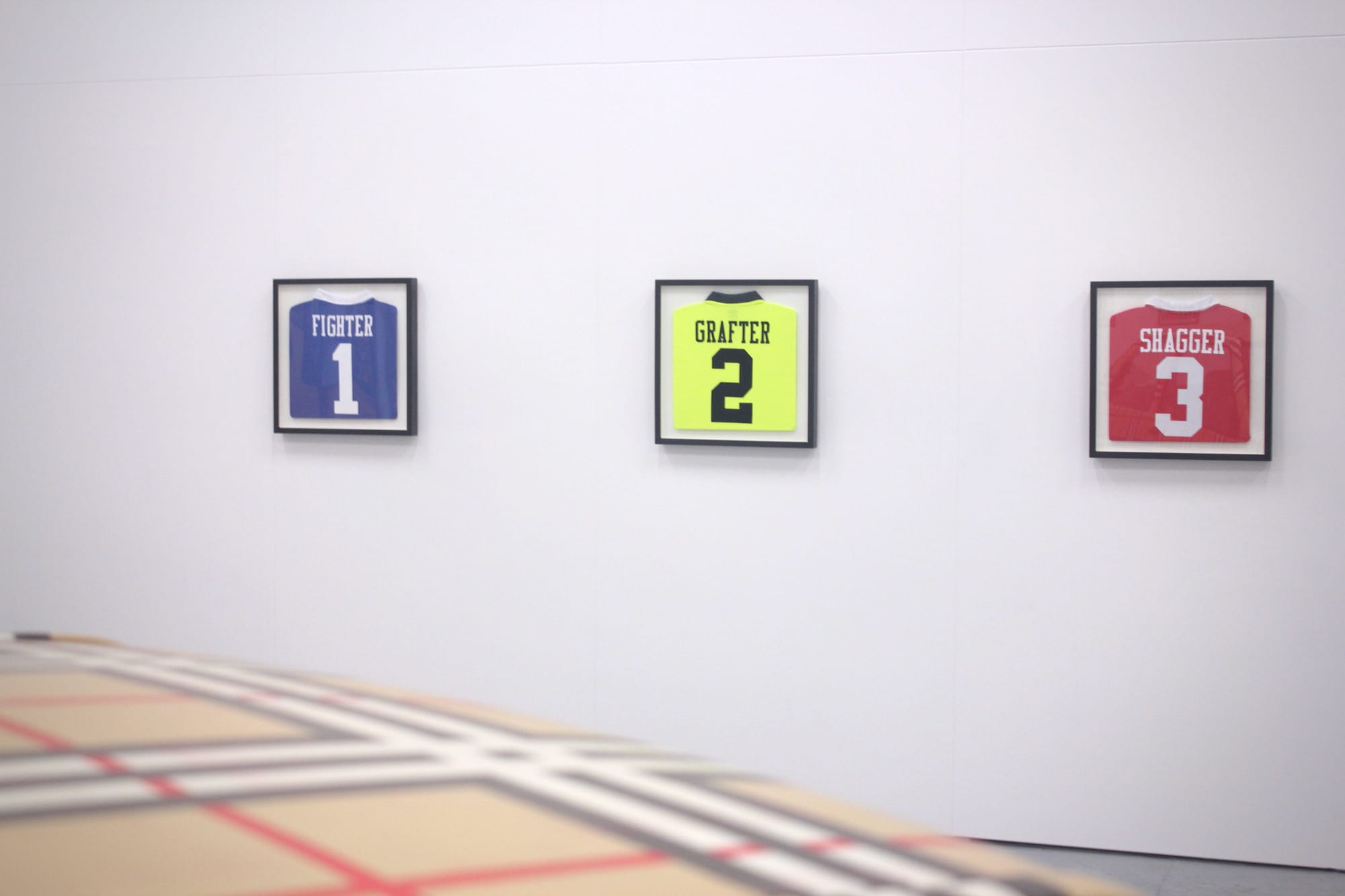
At the start of the year, McLeod went to see All of Us Strangers, the British romantic fantasy written and directed by Andrew Haigh.
“It blew my head clean off, I've never seen a film like that before, and it brought a lot of emotion out of me. I went back and seen it again — I've never went to the cinema and seen the same fucking film twice in the same week, but it stuck with me,” McLeod says.
“I've been going to therapy, and I think that's probably helped me open up some of the conversations that I'm having, and [to] make work about it as a way of presenting it to the world,” he says.
He doesn’t think about it consciously when making his work, but does admit that “as a Glaswegian, humour runs through our blood”. “Humour,” he adds, “helps take the sting out of some of my heavier themes and also makes the work more relatable.”
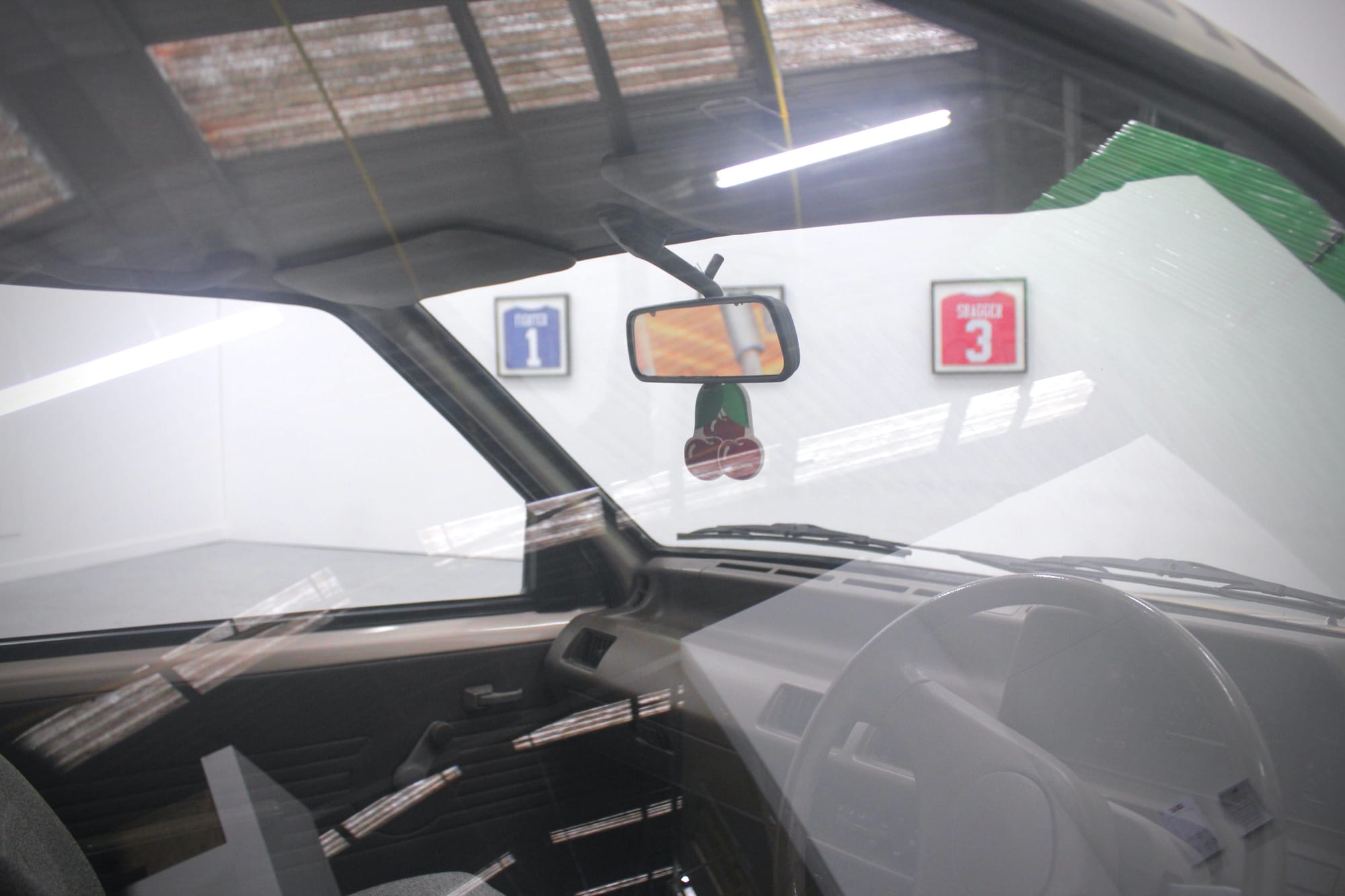
As ever, McLeod does this by opening up a rich seam of nostalgia with incisive wit and a sharp eye — paying respect to a near past at risk of being overlooked, and the objects that trigger memories and emotions.
“90s kids are the last generation that remember a childhood before the internet. We were on the cusp of change. I'm looking back through rose-tinted glasses,” he says.
“[B]ut growing up in the 90s was playing in the backs and closes with your pals. Your mum shouting you in for dinner out the back window. Knowing to be home when the street lights went on ... These memories and rites of passages are what inspires me.”
This article was amended to correct that Trackie's hooped earrings, like his plated front tooth, are also gold ;)
Comments
How to comment:
If you are already a member,
click here to sign in
and leave a comment.
If you aren't a member,
sign up here
to be able to leave a comment.
To add your photo, click here to create a profile on Gravatar.

